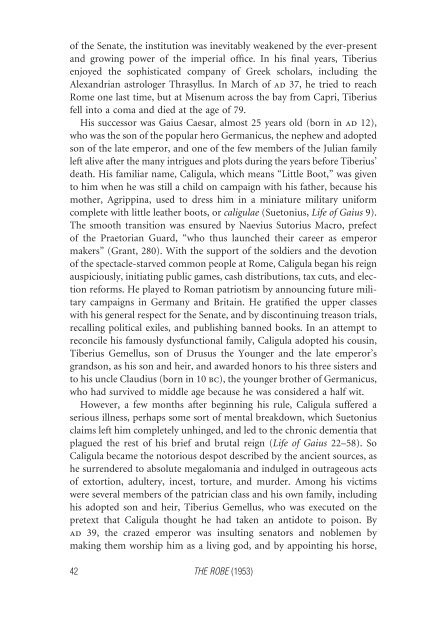Big Screen Rome - Amazon Web Services
Big Screen Rome - Amazon Web Services
Big Screen Rome - Amazon Web Services
Create successful ePaper yourself
Turn your PDF publications into a flip-book with our unique Google optimized e-Paper software.
of the Senate, the institution was inevitably weakened by the ever-present<br />
and growing power of the imperial office. In his final years, Tiberius<br />
enjoyed the sophisticated company of Greek scholars, including the<br />
Alexandrian astrologer Thrasyllus. In March of ad 37, he tried to reach<br />
<strong>Rome</strong> one last time, but at Misenum across the bay from Capri, Tiberius<br />
fell into a coma and died at the age of 79.<br />
His successor was Gaius Caesar, almost 25 years old (born in ad 12),<br />
who was the son of the popular hero Germanicus, the nephew and adopted<br />
son of the late emperor, and one of the few members of the Julian family<br />
left alive after the many intrigues and plots during the years before Tiberius’<br />
death. His familiar name, Caligula, which means “Little Boot,” was given<br />
to him when he was still a child on campaign with his father, because his<br />
mother, Agrippina, used to dress him in a miniature military uniform<br />
complete with little leather boots, or caligulae (Suetonius, Life of Gaius 9).<br />
The smooth transition was ensured by Naevius Sutorius Macro, prefect<br />
of the Praetorian Guard, “who thus launched their career as emperor<br />
makers” (Grant, 280). With the support of the soldiers and the devotion<br />
of the spectacle-starved common people at <strong>Rome</strong>, Caligula began his reign<br />
auspiciously, initiating public games, cash distributions, tax cuts, and election<br />
reforms. He played to Roman patriotism by announcing future military<br />
campaigns in Germany and Britain. He gratified the upper classes<br />
with his general respect for the Senate, and by discontinuing treason trials,<br />
recalling political exiles, and publishing banned books. In an attempt to<br />
reconcile his famously dysfunctional family, Caligula adopted his cousin,<br />
Tiberius Gemellus, son of Drusus the Younger and the late emperor’s<br />
grandson, as his son and heir, and awarded honors to his three sisters and<br />
to his uncle Claudius (born in 10 bc), the younger brother of Germanicus,<br />
who had survived to middle age because he was considered a half wit.<br />
However, a few months after beginning his rule, Caligula suffered a<br />
serious illness, perhaps some sort of mental breakdown, which Suetonius<br />
claims left him completely unhinged, and led to the chronic dementia that<br />
plagued the rest of his brief and brutal reign (Life of Gaius 22–58). So<br />
Caligula became the notorious despot described by the ancient sources, as<br />
he surrendered to absolute megalomania and indulged in outrageous acts<br />
of extortion, adultery, incest, torture, and murder. Among his victims<br />
were several members of the patrician class and his own family, including<br />
his adopted son and heir, Tiberius Gemellus, who was executed on the<br />
pretext that Caligula thought he had taken an antidote to poison. By<br />
ad 39, the crazed emperor was insulting senators and noblemen by<br />
making them worship him as a living god, and by appointing his horse,<br />
42 THE ROBE (1953)



